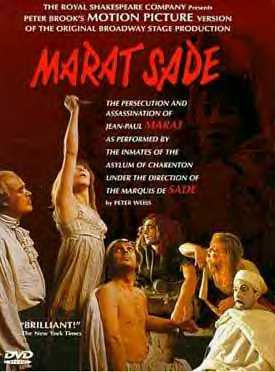Top Qs
Timeline
Chat
Perspective
Marat/Sade (film)
1966 British film by Peter Brook From Wikipedia, the free encyclopedia
Remove ads
The Persecution and Assassination of Jean-Paul Marat as Performed by the Inmates of the Asylum of Charenton Under the Direction of the Marquis de Sade, usually shortened to Marat/Sade (pronounced [ma.ʁa.sad]), is a 1967 British film adaptation of Peter Weiss' play Marat/Sade. The screen adaptation is directed by Peter Brook, and originated in his theatre production for the Royal Shakespeare Company. The English version was written by Adrian Mitchell from a translation by Geoffrey Skelton.
This article has multiple issues. Please help improve it or discuss these issues on the talk page. (Learn how and when to remove these messages)
|
The cast included Ian Richardson, Patrick Magee, Glenda Jackson, Clifford Rose, and Freddie Jones. It was filmed at Pinewood Studios in Buckinghamshire and released by United Artists on 22 February 1967 in the United States, and 8 March 1967 in the United Kingdom. The film's score comprised Richard Peaslee's compositions. David Watkin was the cinematographer.[2] The film uses the full title in the opening credits, though most of the publicity materials use the shortened form.
Remove ads
Plot
In the Charenton Asylum in 1808, the Marquis de Sade stages a play about the murder of Jean-Paul Marat by Charlotte Corday, using his fellow inmates as actors. The director of the hospital, Monsieur Coulmier, supervises the performance, accompanied by his wife and daughter. Coulmier, who supports Napoleon's government, believes that the play will support his bourgeois and reactionary ideas, and denounce those of the more radical stages of the French Revolution that Marat helped lead. His patients, however, have other ideas, and they make a habit of speaking lines he had attempted to suppress, or deviating entirely into personal opinion. The Marquis himself, meanwhile, subtly manipulates both the players and the audience to create an atmosphere of chaos and nihilism that ultimately brings on an orgy of destruction.
Remove ads
Cast
- Patrick Magee as Marquis de Sade
- Ian Richardson as Jean-Paul Marat
- Michael Williams as Herald
- Clifford Rose as Monsieur Coulmier
- Glenda Jackson as Charlotte Corday
- Freddie Jones as Cucurucu
- Jonathan Burn as Polpoch
- Jeanette Landis as Rossignol
- Hugh Sullivan as Kokol
- John Hussey as Newly Rich Lady
- W. Morgan Sheppard as A Mad Animal
- John Steiner as Monsieur Dupere
- Henry Woolf as Father
- Leon Lissek as Lavoisier
- Michael Percival as Patient
Remove ads
Reception
This section needs expansion. You can help by adding to it. (December 2014) |
Film review aggregator Rotten Tomatoes reported an approval rating of 94%, based on 14 reviews, with an average rating of 8/10.[3]
Roger Ebert wrote, "The actors are superb. When we first see the Marquis (Patrick Magee), he looks steadily into the camera for half a minute and the full terror of his perversion becomes clearer than any dialog can make it. Glenda Jackson, as Marat's assassin Charlotte Corday, weaves back and forth between the melancholy of her mental illness and the fire of the role she plays. Ian Richardson, as Marat, still advocates violence and revolution even though thousands have died and nothing has been accomplished."[4]
Film critic Leonard Maltin awarded the film 4 out of a possible 4 stars, calling the film "chilling", and praising the film's atmosphere as being "so vivid that it seems actors are breathing down your neck".[5]
Accolades
The film received the "Youth Jury Mention, feature films" award at the 1967 Locarno International Film Festival.[6] Brook shared the 1969 Nastro d'Argento prize for Best Director of a Foreign Film (shared with Robert Bresson).[7]
References
External links
Wikiwand - on
Seamless Wikipedia browsing. On steroids.
Remove ads

